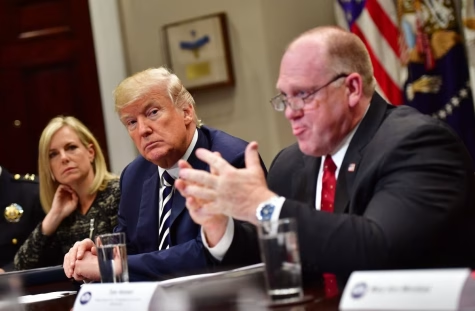
Supreme Court Halts Trump-Era Deportation of Venezuelans Under Wartime Law
The balance of power between the Judiciary and the Executive was thrust into the national spotlight once again as the U.S. Supreme Court temporarily halted the deportation of a group of Venezuelan detainees under a Trump administration directive that invoked the rarely used 1798 Alien Enemies Act. The legal battle highlights a deepening conflict between the nation’s courts and a presidential administration advancing a sweeping anti-gang, anti-immigration crackdown.
At the heart of the controversy is a group of Venezuelan men currently detained in Texas. Civil liberties advocates argue that these individuals were denied basic due process and issued deportation orders in English — even when some could only speak Spanish — without an opportunity to contest their removal in court. The Supreme Court’s recent ruling suspends the deportations, siding with the American Civil Liberties Union (ACLU), which warned that without intervention, the detainees could face a de facto life sentence in one of the world’s most notorious prisons: El Salvador’s Terrorism Confinement Centre (CECOT).
The administration, however, remains defiant. White House Press Secretary Karoline Leavitt denounced the lawsuits as “meritless litigation brought by radical activists who care more about the rights of terrorist aliens than those of the American people.” According to a senior administration official, 137 of the 261 Venezuelans deported as of April 8 were removed under the Alien Enemies Act — a statute previously invoked only during wars, such as World War II and the War of 1812.
A Wartime Law for Peacetime Immigration?
The Alien Enemies Act, passed in 1798, grants the president extraordinary powers to detain and expel nationals from countries considered hostile to the U.S. It was used during wartime against Japanese, German, and Italian nationals. Trump’s use of the law — in a peacetime context — marks a significant expansion of executive authority.
The administration claims that the Tren de Aragua, a violent Venezuelan gang, constitutes a national security threat and thus meets the threshold for invoking the Act. Former Homeland Security Advisor Stephen Miller took to Newsmax and social media to frame the deportations as not only justified, but constitutionally mandated.
The White House posted this statement on Saturday evening:
“MS-13 and TDA are foreign terrorist organizations that have invaded our country,” Miller posted. “The Constitution REQUIRES the President to find them, arrest them and expel them.”
Miller tied immigration policy directly to the broader decay of American civic life, blaming open borders for failing schools, crime-ridden neighborhoods, and fentanyl overdoses. He painted a grim picture of a nation under siege, emotionally invoking families “whose kids are dead and buried in the ground” and women “who have been raped, beaten, or murdered.”
Yet, critics say Miller’s and the administration’s policies bypass constitutional guardrails.
Judicial Caution in the Face of Executive Zeal
In its ruling, the Supreme Court made clear that even under the Alien Enemies Act, deportees must be given a meaningful opportunity to challenge their removal — an essential feature of due process. Justices Clarence Thomas and Samuel Alito dissented from the temporary halt, suggesting a divide within the Court on the scope of presidential power in immigration enforcement.
This is not the first judicial rebuke. A lower court had already blocked the deportations in March, but the administration continued asserting its legal footing. Tensions escalated when it was revealed that Kilmar Ábrego García, a Salvadoran man mistakenly deported under suspicion of gang ties, had never been convicted of a crime. The Supreme Court unanimously ruled he should be returned to the U.S., yet the administration insisted he would “never” live in America again.
Senator Chris Van Hollen (D-MD), who visited Ábrego García in El Salvador, described his case as emblematic of what can go wrong when due process is sidelined in the name of national security.
A Constitutional Crossroads
President Trump, in his second inaugural address this January, vowed to “eliminate the presence of all foreign gangs and criminal networks”. His campaign to purge the U.S. of what he calls “invasive criminal elements” has reinvigorated the debate over the limits of executive authority in immigration.
But critics argue that this aggressive approach blurs the line between lawful immigration policy and extrajudicial punishment. By invoking a wartime statute, bypassing court proceedings, and detaining individuals in foreign jails, the administration risks crossing into constitutional gray zones — with the Supreme Court now serving as the crucial check on unchecked executive power.
The battle is far from over. With legal cases mounting, and civil rights advocates digging in, the judiciary appears poised to serve as a counterbalance to what some describe as a wartime presidency — even in peacetime.
As the conflict between law and executive force escalates, the question looms: How far can a president go in the name of national security before the courts try to overthrow him?
